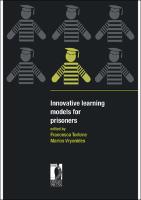Innovative learning models for prisoners
| dc.contributor.editor | Vryonides, Marios | |
| dc.contributor.editor | Torlone, Francesca | |
| dc.date.accessioned | 2022-05-31T10:25:36Z | |
| dc.date.available | 2022-05-31T10:25:36Z | |
| dc.date.issued | 2016 | |
| dc.identifier | ONIX_20220531_9788866559245_572 | |
| dc.identifier | OCN: 1009100937 | |
| dc.identifier.issn | 2704-5781 | |
| dc.identifier.uri | https://library.oapen.org/handle/20.500.12657/55288 | |
| dc.description.abstract | Prison education should be a top priority issue in most societies. Prison conditions must not infringe human rights and dignity and must offer meaningful treatment programmes in order to support inmates in their rehabilitation and reintegration in society. The use of ICTs within a penitentiary context plays a crucial role in that. The present Volume looks at the learning potential in prisons and reports on innovative (e-)learning pathways for basic skills education as designed and tested in Cyprus, Greece, Italy and Romania. Research investigated on what counts as ‘educational’ in such a complex context and how to combine relevant pieces in a ‘learning mosaic’ (the broad range of any learning opportunity across it). This Volume argues that such an approach may be adopted in a wider European perspective within the frame of dynamic security. | |
| dc.language | English | |
| dc.relation.ispartofseries | Studies on Adult Learning and Education | |
| dc.title | Innovative learning models for prisoners | |
| dc.type | book | |
| oapen.identifier.doi | 10.36253/978-88-6655-924-5 | |
| oapen.relation.isPublishedBy | bf65d21a-78e5-4ba2-983a-dbfa90962870 | |
| oapen.relation.isbn | 9788866559245 | |
| oapen.relation.isbn | 9788866559238 | |
| oapen.relation.isbn | 9788892732889 | |
| oapen.series.number | 4 | |
| oapen.pages | 132 | |
| oapen.place.publication | Florence |

